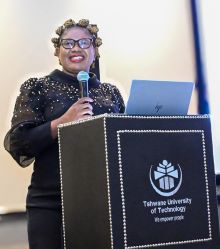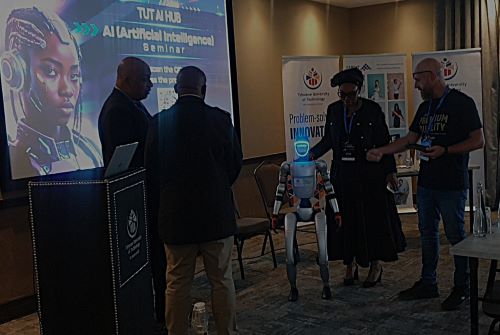Phumla Mkize
Healthcare, transport and education challenges were in the spotlight as local and international researchers and industry leaders in AI (artificial intelligence) gathered for the second day of an AI Seminar hosted by the Tshwane University of Technology in Pretoria, South Africa.
The seminar, supported by the French Embassy in South Africa, Lesotho, Malawi and TUT’s Hub of the Artificial Intelligence Institute of South Africa (AI-ISA), brought together experts from South Africa, France, Switzerland and Greece to discuss AI innovations targeted at solving various societal challenges.
To kick off the second day’s deliberations, Dr Vathiswa Papu-Zamxaka, TUT’s Deputy Vice-Chancellor for Research, Innovation and Engagement, evoked South Africa’s National Science and Innovation Decadal Plan 2022-2032 as her point of departure.
“One of the strategic and critical pillars in this vision is AI, which aligns with national priorities in education, health, digital transformation and industrialisation. The themes at this seminar are thus relevant in ensuring that AI contributes to the national strategy and ensures that it serves as a tool for the empowerment and progress of the nation,” she said.

TUT’s Deputy Vice-Chancellor for Research, Innovation and Engagement
Dr Vathiswa Papu-Zamxaka speaks about the role of AI in key sectors in society.
Dr Papu-Zamxaka added that AI is no longer a futuristic concept, but a present reality that is transforming industries, economies and societies at an unprecedented pace.
“Today, we are witnessing the various advancements AI is making with breakthroughs which are reshaping how we live and work.
“While globally, AI is seen as a tool to enhance decision-making, optimise operations and drive innovation across multiple sectors, it presents unique opportunities in Africa that have the potential to leapfrog development and create sustainable solutions for the continent’s most pressing challenges,” she said.
She also noted some of the successes that are emerging in the healthcare sector particularly in the field of diagnostics.
“Thus, the potential of AI applied to healthcare is significant and could have a bigger impact in Africa. However, these developments must be ethical, inclusive and tailored to the needs of our people,” she said.
Presentations and discussions on the second day delved into AI in the healthcare sector, particularly on innovations to improve diagnostics and treatment, as well as e-health platforms which are transforming the health sector.
Innovations in transport, including tools that use AI to identify and categorise types of road damages were also presented and discussed in the “AI in transport” theme of the seminar.
The day concluded with presentations on AI in the education sector. Cost-effective technologies that can generate training content autonomously for different industries were highlighted. In addition, the opportunity to develop game-changing tools for the higher education sector were presented, including tools for assessment that can reduce lecturer workloads and contribute to uniformity in evaluations.

TUT’s latest acquisition, the humanoid robot, ignites a lot of conversations at and outside the seminar.
